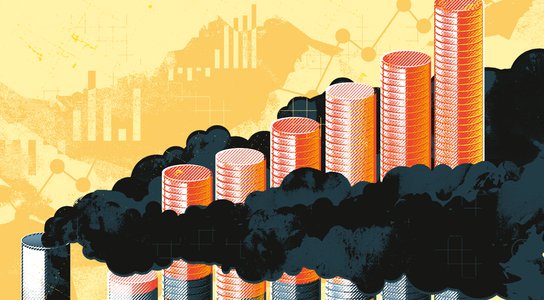Ahead of the G7 meeting in Cornwall, UK, the finance ministers of the seven rich nations due to attend the summit reached a historic deal – agreeing to a global minimum corporation tax rate of 15%.
Such a multilateral agreement (however flawed) would have been unthinkable a few years ago, and demonstrates how much the received wisdom of the extent to which nation states can influence the global economy is being challenged. Similarly, governments’ responses to the ongoing Covid-19 pandemic have shown the extent to which they can intervene in the economy during a time of profound crisis.
So when it comes to tackling the climate crisis, the assembled leaders should be similarly bold, taking ambitious action to take on this looming threat. While the immediate priority of the pandemic response will naturally be front of mind, one of the many things we’ve learned from the past year is that it’s infinitely preferable to head off an upcoming crisis, rather than deal with the fallout once it hits.
Keep the world’s forests standing
The G7 is a crucial opportunity for global leaders to show their commitment to tackling global deforestation, which is one of the key drivers of the climate crisis.
While most deforestation is taking place in countries not represented at the summit, this destruction is being driven in large part by the activities of businesses based in the G7 nations. This includes financial institutions that have contributed billions of dollars to financing to companies involved in deforestation.
G7 governments must commit to bringing in new laws that require businesses, including financial institutions to check that their operations and financing are not linked to forest destruction and associated human rights abuses, and penalise those who continue their destructive practices.
There have been some promising moves from G7 countries on this front. UK legislation on deforestation due diligence is making its way through Parliament – though some key changes are needed for the law to live up to the government’s ambition for it to be ‘world-leading’. The European Commission has also committed to put forward a legislative proposal this year, after a consultation in which almost 1.2 million people told the Commission they want strong rules to end EU member states’ complicity in global deforestation.
However, the US is behind the curve on this issue and if President Biden wants to prove his much-vaunted climate credentials, he must commit to backing similarly ambitious legislation, like that being touted by Senator Schatz. A commitment to binding domestic legislation by G7 countries is crucial and will help build momentum for the key COP26 summit later this year.
We must also keep an eye out for false solutions and greenwashing emerging from the G7. There is lots of talk about helping mobilise finance to protect nature, but ultimately we need to stop finance bankrolling deforestation, biodiversity loss and associated human rights abuses in the first place. Governments and companies will likely be making a lot of noise about emerging mechanisms like the Taskforce on Climate-related Financial Disclosures and the Taskforce on Nature-related Financial Disclosures, but many of these initiatives fall short when it comes to addressing global deforestation.
End support for fossil gas
The fossil fuel industry is trying to convince citizens and governments that gas is a route to minimising emissions. However, fossil gas is part of the problem. Each unit of fossil gas that is extracted and burned sets the world back from achieving the Paris Agreement goal of keeping warming under 1.5°C. In order to do this, gas production and consumption must drop by 40% worldwide over the next decade.
At the G7 summit, leaders will be keen to demonstrate their commitment to combatting the climate crisis. However, they cannot do this while supporting continued investment in fossil gas.
In the EU, carbon dioxide emissions from fossil gas have now exceeded those from coal. Yet since 2013, the European Union has spent nearly €5 billion in taxpayer funded grants and subsidised loans for gas projects. The EU member states in attendance at the G7 must push the European Commission to stop subsidising fossil gas projects if they are to stand any chance of meeting their climate commitments.
Meanwhile in the US, gas exports have hit new record highs, following record highs each year since 2016. This boom is set to continue with the US fossil fuel industry planning to build out the infrastructure that will enable them to export more and more each year.
It should go without saying that this is completely incompatible with President Biden’s promises to prioritise climate justice. Biden needs to show transformative climate leadership, by committing to Build Back Fossil Free, and put an end to the US’s role in shipping climate-wrecking fossil fuels to the rest of the world.
At the same time, G7 governments need to stop looking to fossil fuel companies for advice on climate strategy. In the same way the tobacco industry was barred from lobbying on health policy, a firewall needs to be built between public officials and fossil fuel companies.
Hold Big Tech accountable
We cannot allow democratic efforts to tackle the multiple crises the world faces to be derailed by disinformation and division fostered on social media platforms. The real-world consequences of what happens online are becoming ever more apparent: election results are doubted, and society is becoming increasingly polarised.
The way we see it, the power of Big Tech to influence and shape how we view the world and their pursuit of user engagement limits our ability to imagine and shape a progressive, equitable, and sustainable future.
To maintain the best of what social media platforms can offer, to redeem our democracies and have any hope of tackling collective threats like the climate crisis requires good faith debate and agreement on the facts.
That’s why we’re calling for G7 governments to hold social media companies to account and put an end to their damaging and corrosive business model which sees them profit from amplifying conspiracies, misinformation, and hate in echo chambers they themselves have curated.
While their influence is substantial (and growing all the time), Big Tech companies are not too big to be made to change. The G7 countries’ finance ministers have already shown how multilateral action can pin down big corporations seeking to avoid their responsibilities. Now it’s time for their heads of government to do the same.


